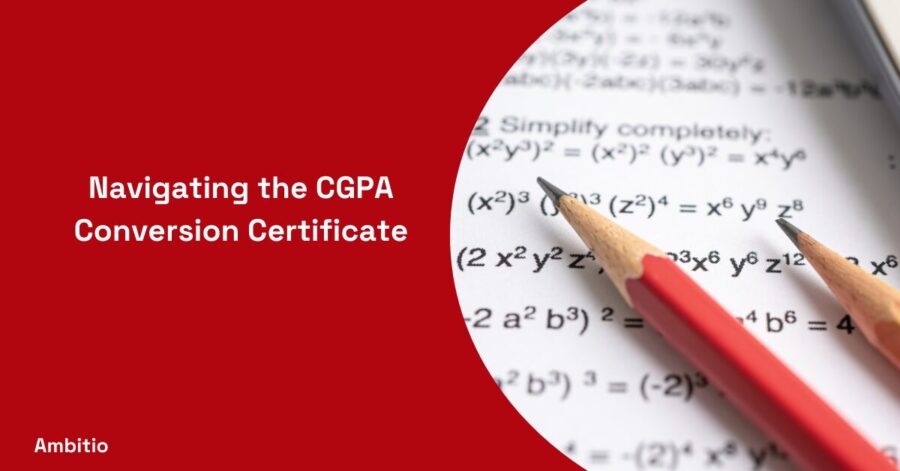13 December 2024
5 minutes read
Navigating the CGPA Conversion Certificate: Essential Insights for Students in Technology and Engineering

In today’s competitive academic and professional landscape, understanding the nuances of the CGPA (Cumulative Grade Point Average) to Percentage Conversion Certificate is of paramount importance.
This blog delves into the significance of this conversion, the role of technology in facilitating it, and how various educational institutions implement this process. It’s a guide tailored for students, educators, and professionals in fields like engineering and science, where precision in academic evaluation is critical.
The Fundamentals of CGPA and its Importance in Academic Evaluation
Understanding the CGPA System
The CGPA system is a widely used academic evaluation method, particularly in institutes of technology and universities focusing on science and engineering. It provides an average of a student’s academic performance over a certain period, typically a semester or an academic year. Unlike traditional marking systems, CGPA offers a more comprehensive overview of a student’s consistent performance.
Why CGPA Matters
In competitive fields like engineering, a student’s CGPA can be a critical factor in securing internships, placements, or further study opportunities. It’s a reflection of their academic diligence and conceptual understanding, which are crucial in technically demanding disciplines. However, with the global diversity in education systems, converting CGPA into a universally understood percentage format becomes essential.
Navigating the Conversion from CGPA to Percentage
The Conversion Process
The conversion of CGPA into a percentage involves a specific formula, which may vary between institutions and national education systems. This formula is designed to equitably translate a student’s cumulative performance into a percentage format, thus making it easier for international institutions or employers to assess their academic credentials.
Tools and Technology for Conversion
Modern technology has simplified this conversion process. Many institutes of technology have developed online tools and software that automatically calculate the percentage of CGPA. This not only ensures accuracy but also makes the process more efficient and accessible for students and faculty.
The Integration of CGPA to Percentage Conversion in Universities
Adoption of the Conversion System
Institutions, especially those specializing in science and engineering, are increasingly integrating the CGPA to Percentage Conversion Certificate into their evaluation systems.
This integration is part of a broader effort to standardize academic assessment and make it more transparent and comparable across different educational contexts.
Impact on Students and Educators
For students, this conversion certificate becomes a gateway to opportunities in higher education or the professional world. For educators, it provides a standardized benchmark to evaluate and guide students from diverse educational backgrounds.
The Role of National Educational Bodies in Standardizing the Conversion Formula
Formulating the Conversion Standards
National educational bodies play a significant role in formulating and standardizing the CGPA to percentage conversion formula. By providing a uniform conversion methodology, these bodies ensure a level of consistency and fairness in the evaluation process across different institutions.
Implications for International Students
For international students, this standardization is particularly beneficial. It allows them to present their academic credentials in a format that is recognizable and valued globally, thereby facilitating their academic and professional mobility.
The Technological Advancements in CGPA Conversion Processes
Innovations in Conversion Tools
The advent of sophisticated software and algorithms has revolutionized the way CGPA is converted to a percentage. These technological advancements have not only expedited the process but have also enhanced its accuracy, minimizing human error.
Access to Conversion Tools
Many universities now offer these conversion tools on their websites, allowing students to easily calculate their percentage scores. This accessibility is a significant step forward in democratizing the academic evaluation process.
Preparing for a Global Academic and Professional Landscape with CGPA Conversion
The Global Context
In a globalized educational environment, understanding and effectively utilizing the CGPA to Percentage Conversion Certificate is crucial. It enables students from various national education systems to compete and collaborate on an international platform.
Strategies for Students
Students must familiarize themselves with the conversion process and tools available, ensuring they can accurately present their academic achievements when applying for international programs or global job opportunities.
Challenges and Solutions in CGPA to Percentage Conversion
Challenges in CGPA to Percentage Conversion
- Varying Conversion Formulas Across Institutions: Different universities and educational systems use distinct formulas to convert CGPA into a percentage. This variation can lead to confusion and inaccuracies when students apply to international programs or jobs.
- Lack of Standardization Globally: There is no universally accepted standard for converting CGPA to percentage. This lack of standardization poses challenges for students seeking global opportunities.
- Technological Disparities: Not all institutions have the resources to implement advanced technology for accurate and efficient conversion. This can disadvantage students from less technologically equipped universities.
- Awareness and Accessibility: Many students and educators are not fully aware of the correct conversion processes or the tools available, leading to potential misrepresentation of academic achievements.
- Handling Decimal Variations: The conversion process often involves rounding off decimals, which can sometimes impact the precision of the final percentage score.
- Cultural and Educational Differences: Different educational cultures give different weightings to grades, which can affect how a CGPA is perceived after conversion.
- Adapting to Changing Educational Landscapes: As educational systems evolve, keeping the conversion formulas updated and relevant is a continuous challenge.
Solutions to Overcome These Challenges
- Developing Universal Conversion Guidelines: National and international educational bodies can collaborate to develop more standardized conversion guidelines, reducing inconsistencies across different systems.
- Investing in Technology: Institutions should invest in advanced software and online tools for CGPA conversion, ensuring accuracy and accessibility for all students.
- Awareness Campaigns: Universities and educational institutions can conduct awareness campaigns and workshops to educate students and faculty about the correct conversion processes and available tools.
- Collaborations Between Institutions: Universities can collaborate to understand and respect each other’s grading systems, facilitating smoother conversions for student exchanges and applications.
- Implementing Rounding Rules: Establishing clear rules for handling decimals in conversion can enhance the precision and fairness of the process.
- Acknowledging Cultural Differences: Educational systems and global employers can be sensitized to the nuances of different grading cultures, ensuring a more holistic evaluation of academic records post-conversion.
- Regular Updates and Reviews: Continuous review and updates of conversion formulas in line with evolving educational practices can help maintain relevancy and accuracy.
By addressing these challenges with proactive and collaborative solutions, the process of converting CGPA to percentage can be made more efficient, equitable, and transparent, benefiting students and educators in a global academic landscape.
Conclusion
The CGPA to Percentage Conversion Certificate is more than just a document; it’s a bridge connecting different educational systems, facilitating students’ academic and professional journeys.
As technology and global education standards evolve, so will the methods and importance of this conversion process. Understanding and adapting to these changes is crucial for students and educators in the fields of science and engineering.
FAQs
Q1. How accurate are online CGPA to percentage conversion tools?
Online conversion tools developed by reputable educational institutions are generally very accurate, as they are based on standardized formulas and regularly updated algorithms.
Q2. Can the CGPA to percentage conversion vary between different countries?
Yes, the conversion formula can vary depending on the grading system and standards set by the national educational bodies of different countries.
Q3. Is the CGPA to Percentage Conversion Certificate recognized globally?
While the conversion certificate is widely recognized, its acceptance may vary based on the institution’s or employer’s familiarity with the specific grading system used by the issuing body.

You can study at top universities worldwide!
Get expert tips and tricks to get into top universities with a free expert session.
Book Your Free 30-Minute Session Now! Book a call now




























